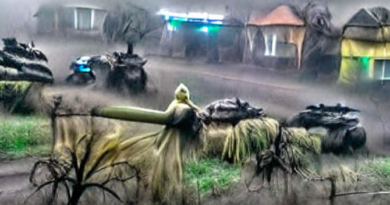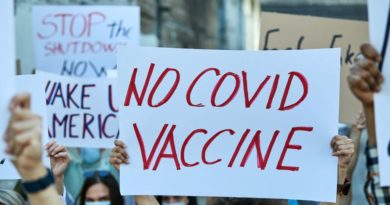Angela Merkel’s New Year’s speech: ‘Toughest year’ of chancellorship

In her traditional New Year’s address to the nation, German Chancellor Angela Merkel made no attempt to sugarcoat her challenging final full year in office.
“I don’t think I am exaggerating when I say that never in the past 15 years have we all experienced such a difficult year,” she said in the annual address that is broadcast to millions of people.
In the pandemic that ravaged the whole world, 1.7 million Germans have been infected by COVID-19 and over 32,000 have died. And numbers are rising: On Wednesday, Germany saw over 1,000 deaths in a single day for the first time.
“The coronavirus pandemic was and is a once-in-a-century political, social and economic challenge,” Merkel acknowledged. “It is a historic crisis that has demanded a great deal of all of us and too much of some of us. I know that mustering this historic effort has required tremendous trust and patience on your part, and continues to do so. For that, I am sincerely grateful to you.”
Merkel dismisses conspiracy theorists
The chancellor highlighted the work that medical professionals had done in fighting the virus, but also listed a number of other key workers who have been instrumental in 2020.
“Countless people have helped make it possible for our lives to go on through the pandemic,” she said. “In supermarkets and freight transport, at post offices, on buses and trains, at police stations, in schools and day-care centers, at churches, in editorial offices.”
She gave conspiracy theories short shrift. The “Querdenker” or “lateral thinking” movement has become more popular among a minority in Germany during the pandemic, with thousands staging rallies against compulsory mask-wearing and other restrictions on public life. Some believe the vaccine is meant to control people or that the coronavirus does not exist.
“Conspiracy theories are not only dangerous and untrue, they are also cynical and cruel to those who are suffering,” Merkel said.
Vaccine offers hope
Germany, along with the rest of the EU, began its vaccination program on December 27 and vaccines are expected to continue to roll out during January. Merkel pointed out that the vaccine offers hope.
“But I feel hope, and in recent days this hope has been reflected in the faces of the first people to be vaccinated: the oldest among us and those who care for them, and the medical staff of intensive care units – not only here in Germany, but throughout Europe and around the world,” the chancellor said.
Merkel also repeated her promise that she would be vaccinated “when my turn comes.” Unlike in countries like the US, Germany did not count top-tier politicians among the first to receive the vaccine.
The BioNTech-Pfizer vaccine which was the first reliably approved and administered drug in the world was developed in the German city of Mainz. Merkel singled outthe Turkish-German married couple who were at the heart of its development.
“Ugur Sahin and Ozlem Tureci from Mainz, the founders [of BioNTech], told me that people from 60 countries are working for their company. I can think of no better example of how European and international cooperation, the strength of diversity, is what brings progress.”
Merkel’s last year
Despite the pain that 2020 brought, the chancellor concentrated on the hope that she believes 2021 will bring. It is also the last time Merkel will ring in the new year as leader of Germany.
“Finally, I would like to say something personal. There will be federal general elections in nine months, and I will not be running for re-election,” Merkel, who has been in power since 2005, said in her closing remarks. “Today I am likely speaking to you on New Year’s as Federal Chancellor for the last time.”
Despite the challenges that the final nine months of her chancellorship may bring, Merkel nevertheless remained optimistic as she ended her address:
“Never have we greeted the new year with so much hope, despite all of our concerns and some skepticism. And so you and your families have my very best wishes for good health, confidence and blessings in the New Year 2021.”
*** This article has been archived for your research. The original version from DW (English) can be found here ***


